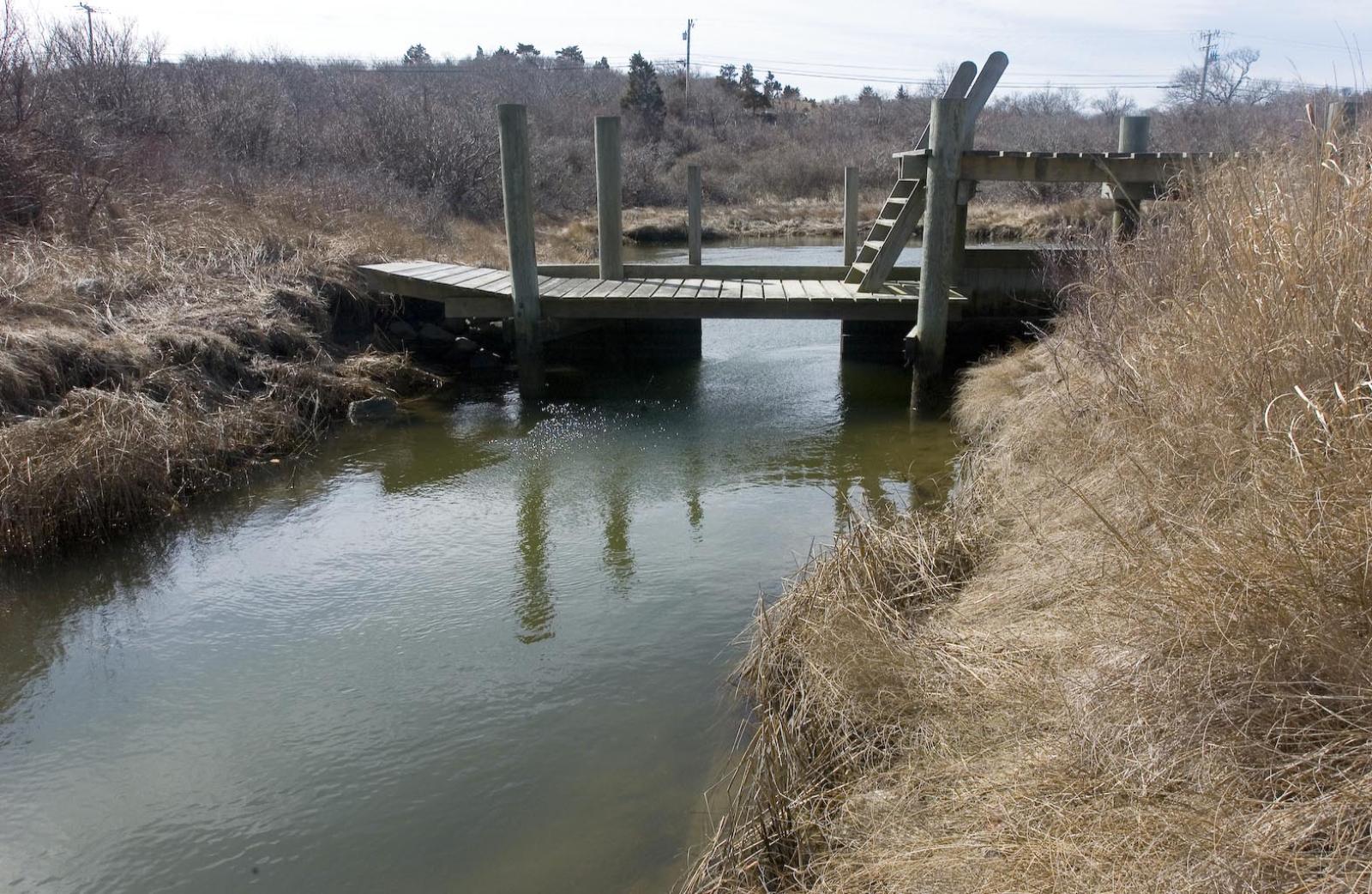Herring are harbingers of spring. The first of them usually appear in Island waters now. But there is serious concern about the health of the fishery across the region.
Although Massachusetts is in the third year of a moratorium on the harvesting of these small fish, the fishery has failed to rebound. Fishing prohibitions are also in place in Connecticut and Rhode Island.
Also known as alewives and river herring, these anadromous fish make a pilgrimage every spring into coastal estuaries, to spawn in the freshwater pond where they themselves were created.
Years ago herring was a huge industry. Fishermen set up tents at Mattakessett and harvested fish at night by the tons. The fish were exported to the mainland by the barrels.
Today these fish are a fraction of what used to be.
In the last few years river herring have become the flashpoint for a battle between conservation groups trying to protect habitat and fish stocks and an expanding commercial fishing industry working offshore.
Herring are forage fish. Just about every fish that swims in the ocean feeds on herring to grow and prosper. Osprey, bluefish, striped bass and even whales feed on these animals come to these waters to feed on them when they are small fry to adult.
Herring feed on algae, transforming the microscopic plants and animals that are in the water column into protein that bigger fish can eat.
“Herring are important forage fish for a lot of species. The osprey migrate north following the return of the herring,” said David Grunden, shellfish constable for Oak Bluffs.
Massachusetts has about 100 herring runs in varying stages of health. There has been an overall effort on land to build herring ladders to ensure that when the fish return they can climb into the freshwater ponds. On the Vineyard alone, there are more than five herring runs.
Oak Bluffs and Tisbury share a well-managed herring run at the Head of Lagoon Pond, named after Richard Madeiras, Mr. Grunden’s predecessor. Up until the moratorium, Tisbury and Oak Bluffs managed the run, setting catch limits and times when fishermen could harvest the fish.
The shellfish constables, noticing a decline in the herring run, took steps to lower the catch limits to as little as a small bucket of fish per night. For the last two years the run has been closed to all fishing.
Derek Cimeno, shellfish constable for Tisbury, who shares the responsibility for the herring run with Mr. Grunden, said he saw just two herring this week. He is concerned.
“We had some really great years five or six years ago,” Mr. Cimeno said.
The Aquinnah herring run managed by the Wampanoag Tribe seems to be the only Vineyard run doing well.
Elsewhere in the state, herring stocks are a fraction of what they were.
Now attention is being directed to what is happening offshore. It is widely known that the herring from the Vineyard and Cape Cod will spend their summers in the Gulf of Maine and as far east as Georges Bank.
“They go to the Gulf of Maine in summer and farther south off the Carolinas and New Jersey in the winter. Herring follow the same scenario as shad,” said Mike Armstrong, who studies anadromous fish for the state Division of Marine Fisheries.
Mr. Armstrong is charged with overseeing the herring fishery. He said since the herring moratorium was imposed, he believes the stocks at the runs have stabilized and fortunately not gotten worse. But he also is concerned that the herring have lost freshwater habitat.
“If we stopped fishing for everything, the herring won’t necessarily come back because you have lost habitat,” he said. “If we had a healthy herring fishery, it would only be a remnant of what was here 300 years ago.”
With the moratorium due to end this year, the next big question is what to do next. Options are to extend the moratorium, lift the moratorium or impose restrictive catch limits.
“We are putting together a technical report that will come out next year on the state of the stock. It will be based on scientific data, landings and an awful lot of data that we’ve collected in the last four years,” Mr. Armstrong said.
Responding to the concerns of many conservation groups that are worried that the fish are being harvested offshore, Massachusetts fisheries managers and lawmakers are looking to put in new measures to monitor that catch by inspecting landings at the dock.
That legislation is written into the environmental bond bill which is being reviewed at the State House now. A key section gives the state Division of Marine Fisheries funds to hire staff to be at the docks when forage fish are being landed.
Tom Rudolph, of the Cape Cod Hook Fishermen’s Association, is pushing hard to get government fisheries managers to look at the offshore impact on the survival of herring.
“There is tons of anecdotal and lots of empirical evidence that suggest that river herring are being caught offshore by midwater trawlers with large nets,” Mr. Rudolph said.
Last year the midwater trawlers were kicked out of the waters of Gulf of Maine because of concerns they were having a detrimental impact on the rich fishing grounds.
“They are the largest fishing vessels in New England,” Mr. Rudolph said. “They range in size from 100 to 165 feet in length with nets that measure the length of a football field and have the width of a soccer field. Their mesh is graduated in size and can catch fish four inches in length. It is well known that these fishing boats have a big bycatch.”
Now those fishing boats, numbering at least 30, can fish with little restriction in the federal waters from here south.
“There is no real comprehensive monitoring when these fishing boats come in to offload 500,000 to 1 million pounds of fish at a time,” Mr. Rudolph said.
Vineyarders are irritated over why the herring haven’t rebounded, given that fishermen are prohibited from catching what was once a local staple product in spring.
Paul Bagnall, shellfish constable for Edgartown, said: “The state and federal fisheries managers have to get down and figure out what is happening here. I am not seeing the return as we’d like.”
Bret Stearns, natural resource director for the Wampanoag Tribe of Aquinnah, has some faith in the future of herring, at least in Vineyard waters.
“The run is certainly less than what it was years ago but it is abundant enough to sustain the fishery,” Mr. Stearns said of the tribe’s Aquinnah run. “Last year we saw a terrific yield of herring fry. They flooded the waters around Dogfish Bar, Menemsha Pond and off Noman’s Land. There were huge schools of herring fry out there.”
“I think we are doing our part, which is the best we can do,” Mr. Stearns said.






Comments (1)
Comments
Comment policy »